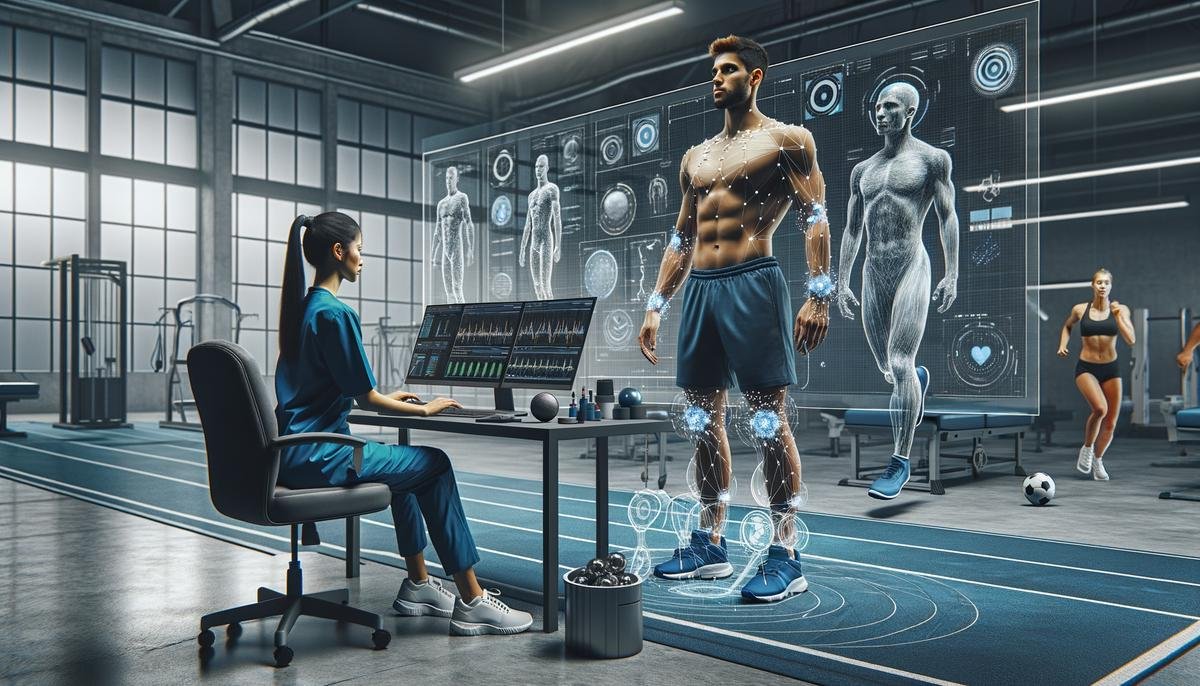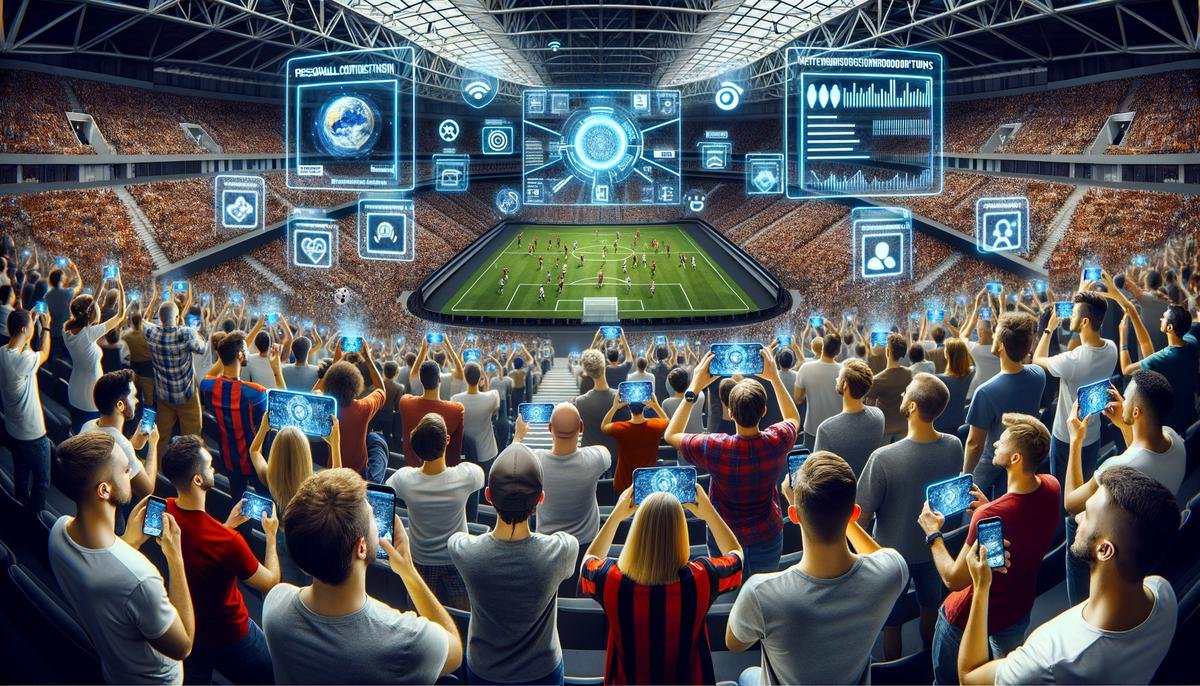AI-Driven Performance Enhancement
Artificial Intelligence (AI) is altering the landscape of sports by enhancing athlete performance. Coaches and sports scientists are harnessing AI to analyze vast amounts of data collected from wearable devices attached to athletes. These devices monitor heartbeat rates and detailed biomechanical movements during training and gameplay.
By assessing extensive data sets, AI algorithms can identify patterns and anomalies that human analysis might overlook, allowing for personalized training regimens. For example, if a soccer player is exerting more energy in the first half of a match, AI-driven insights can help customize fitness programs to enhance stamina.
Predictive analytics take this further by forecasting potential outcomes based on past performance metrics. This helps in strategizing for games and potentially extends athletes’ careers by foreseeing injury risks and suggesting preventive measures. AI could help predict a potential stress fracture developing in a runner, and intervening through customized training adjustments could prevent injury.
Tactical decision-making has never been more scientific in sports. Coaches are using AI-generated insights to determine the best moments to execute specific plays or when to make strategic substitutions during a match. This level of data-driven decisioning can overturn the era of ‘gut-feeling’ coaching, moving towards more evidence-based strategies.
AI in sports is enhancing current performances, paving the way for sustainable practices, prolonging career lifespans, and transforming how stakeholders interact with data in real-time. As AI sophistication continues to climb, intelligence is becoming a tangible, quantifiable asset on the field.

Injury Prevention Through AI
Advancements in AI have streamlined injury prevention methodologies in sports. AI systems scrutinize parameters of athletes’ health and biomechanics, assisting in proactive care management and mitigating injuries before they escalate into long-term setbacks.
Companies like Sparta Science utilize AI to craft individualized training programs developed from data points derived from force plates. These data points help delineate force and pressure exerted by and on an athlete during physical activities. The model gauges biomechanical imbalances which often translate into potential injury sites. By embedding AI into regimens, trainers and physiotherapists can preemptively administer corrective exercises that reduce the risk of injury.
Sports bodies are leveraging machine learning models to assess training loads and athlete fatigue levels. These models consider data such as:
- Heart rate variability
- Sleep quality
- Other physiological stress indicators
By fine-tuning an athlete’s training intensity based on fatigue status, it’s feasible to circumvent overtraining syndromes which form a part of sports injuries.
AI-driven rehabilitation protocols present another dimension where recovery programs are customized according to an athlete’s responsive feedback and recovery progression. This personalized approach is optimized continuously through machine learning algorithms that adapt the program to cater to the physiological healing scale and readiness of the athlete.

AI and Fan Engagement
AI is transforming fan engagement in sports by delivering personalized content that enhances the viewer experience. Machine learning algorithms analyze viewing patterns and social media interactions to curate tailored content for each fan. This might mean recommending game highlights featuring a fan’s favorite players or providing analysis of tactics and strategies that pique their interests.
The combination of AI with augmented reality (AR) and virtual reality (VR) offers fans immersive experiences. Through these technologies, a spectator can virtually attend a game, experiencing the thrill of the stadium from their living room, or even take a first-person perspective of a player on the field. This level of interaction deepens the connection fans feel with their favorite teams and athletes.
Interactive platforms powered by AI enhance fan interaction by fostering a two-way dialogue. AI-powered chatbots can serve as 24/7 assistants, answering queries, providing updates, and offering personalized shopping advice for merchandise. These virtual assistants are constantly learning from interactions to improve their responses and offer more relevant information over time.
Through real-time data analytics, AI tools generate dynamic viewing experiences tailored to fan preferences. This intelligent content adaptation makes viewing more engaging and turns casual viewers into passionate fans by continuously meeting their dynamic needs and interests.
AI’s role in redefining fan engagement facilitates deeper emotional connections and builds a more interactive, responsive, and inclusive sporting world. As technology continues to advance, the potential for AI to revolutionize the fan experience is vast.

Labor Market Transformation
AI’s integration into sports is creating innovative job roles and displacing some traditional positions. Teams, leagues, and sports organizations are increasingly in need of data analysts, machine learning engineers, and AI system managers. These professionals extract and interpret vast amounts of performance and engagement data, enabling enhanced decision-making and personalized fan experiences.
Data analysts in the sports industry provide insights that directly influence athletic performance and business strategies. These insights range from optimizing player health and game tactics to enhancing spectator engagement and merchandise sales. As AI tools refine data analysis processes, the role of analysts evolves, requiring a deeper understanding of sports science and advanced data manipulation techniques.
As specialized roles gather momentum, some traditional functions within the sports sector encounter a gradual decline. Automation through AI technologies causes roles that involve repetitive tasks and data handling, such as:
- Ticket sales agents
- Entry-level statistical clerks
- Some merchandising positions
These roles become less essential as automated ticketing systems and AI-driven inventory management systems can streamline operations, reducing the need for human intervention.
AI’s capability to monitor and report on live game statistics has revolutionized sports broadcasting, potentially reducing the number of people needed in various production roles. Technological tools can deliver insights and graphics instantly during broadcasts, duties that previously required a larger human staff.
Even as AI propels the displacement of certain jobs, it also encourages a reskilling revolution. Proactive sports organizations are initiating training programs to help current employees adapt to the rapidly shifting technological landscape. This transition bridges the gap from old roles to new opportunities, fostering a workforce that is technologically adept and versatile.

Ethical and Regulatory Challenges
The ethical and regulatory landscape surrounding the use of AI in sports is complicated. With vast amounts of data being collected, the privacy of athletes and fans becomes a paramount concern. Ensuring that personal and biometric data are handled in a way that respects privacy rights demands strict adherence to data protection laws, which can vary from one region to another. Sports organizations must maintain transparency with stakeholders about their data handling policies.
Bias in AI algorithms presents another significant ethical concern. When AI is used to make decisions in sports, such as player selection, gameplay decisions, or fan engagement strategies, the underlying algorithms must be free from biases that may affect fairness and impartiality. This involves careful design and continuous monitoring of AI systems to ensure they do not inadvertently perpetuate existing prejudices, which could skew talent recruitment or game strategies based on biased data interpretations1. Addressing these issues is not just a matter of ethical sportsmanship but also of maintaining competitive integrity.
The fairness of AI-driven decisions extends into the arena of gameplay itself. AI technologies, such as computer vision for officiating or performance analytics, must operate under rigorously tested frameworks to ensure that all teams and players are judged by the same standards. This level of scrutiny is essential for the fairness of competitions and for the acceptance of AI interventions by all stakeholders.
Regulatory challenges arise as these technologies intersect with global sports operations. Different countries may have disparate regulations concerning AI and data usage, complicating the landscape for international events where multiple regulatory regimes intersect.
Navigating these ethical and regulatory waters requires a proactive approach from sports organizations. Establishing robust governance structures and ongoing education about AI’s capabilities and limitations will be crucial. By prioritizing ethical considerations and aligning closely with emerging regulations, the sports industry can make full use of AI’s potential while upholding the values of fairness and integrity that are fundamental to sports.

AI’s integration into sports is fundamentally transforming the industry. By leveraging AI, sports organizations can optimize athlete careers, enhance fan experiences, and manage the intricacies of modern sports with greater efficiency and effectiveness. The potential benefits are vast, but so are the challenges. Addressing ethical concerns, data privacy issues, and regulatory hurdles will be crucial in shaping the future of AI in sports. As the technology continues to evolve, it will be up to the sports industry to harness its power responsibly and equitably, ensuring that the fundamental values of sportsmanship are upheld in this new era of intelligent athleticism.
- Mehrabi N, Morstatter F, Saxena N, Lerman K, Galstyan A. A survey on bias and fairness in machine learning. ACM Comput Surv. 2021;54(6):1-35.




